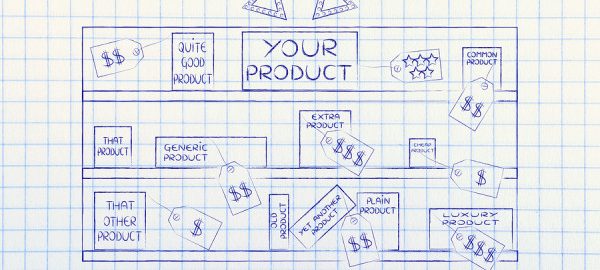
There’s always a competitor in the sales process. Even if there’s not another vendor that’s being considered, “do nothing” or “do it internally” can be your biggest competition.
Without the ability to clearly differentiate your solution, and understand its value, a buyer’s decision is arbitrary and often price-driven.
Focus on Meaningful Value
When you differentiate on value, you can avoid the dreaded discounting that happens at the end of sales cycles. If you’re constantly having to lower your price to close a deal, you will lose margin and find yourself scraping the bottom of the barrell to meet your quota.
It’s important that the value has meaning to the individual buyer. You can tell me your marketing solution provides the ability for me to have 100,000 contacts in the system. If I only need 45K contacts, that feature means nothing to me. Buyers need to see the core benefits that your solution provides, in terms of what’s important to their business needs. You can rattle off features and functions that make your solution different, but if those qualities aren’t vital to the buyer’s business, your product will seem too expensive or not an adequate solution.
Remember, there is as much differentiation in how you sell as there is in what you sell.
Offer Tangible Examples
Buyers want to know that you can do what you say you can do. They want evidence of past success. When you have proof to back up your differentiation, it’s much easier for the buyer to defend the spend.
“I know we can do that at your company, because at Company X, we implemented this solution and cut their time-to-market by 50%, saving them $ 500,000.”
Proof of performance helps alleviate buyer skepticism. Telling buyers you can cut their processing costs by 25% is one thing. Hearing that same metric from three of your customers is much more impactful — and help buyers believe your differentiation.
It’s Not About You
Even when you are trying hard to focus on the customer in your conversations, it can be difficult to not share the bells and whistles about your company. Potential customers really don’t care about your financial stability or company culture when they’re trying to solve a problem. They want to know how your solutions can help them achieve their business objectives. The best way to set your solution apart from the competition is to speak in the buyer’s language. How long you’ve been in business or who you have worked with may help a buyer feel comfortable signing the check, but it’s not going to seal the deal when it comes to competitive differentiation.
Business & Finance Articles on Business 2 Community
(86)
Report Post







